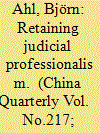| Srl | Item |
| 1 |
ID:
131952


|
|
|
|
|
| Publication |
2014.
|
| Summary/Abstract |
In 2011 and 2012, the Supreme People's Court (SPC) published its first "guiding cases." Guiding cases serve as decision-making models that must be taken into account by lower courts when deciding similar cases. This study argues that the establishment of a national formal legal mechanism to improve consistency in adjudication across jurisdictions and geographical boundaries will strengthen judicial professionalism. The guiding cases system provides the SPC with an instrument to steer adjudication in lower courts discreetly, thereby allowing it to exercise significant influence over legal developments. Given the complexity of cases, compared to law set out in statute, non-lawyers may have tremendous difficulty in understanding and assessing the effects of guiding cases; this in turn acts as a protective mechanism against extra-legal interference. The reform is an example of the SPC's delicate manoeuvring in order to retain judicial professionalism in a hostile yet politically conservative environment. It reflects an attempt by the SPC to strengthen its position vis-à-vis other actors of the party-state and to consolidate the judiciary's function as an adjudicative institution that works on the basis of formal legal mechanisms.
|
|
|
|
|
|
|
|
|
|
|
|
|
|
|
|
| 2 |
ID:
172284


|
|
|
|
|
| Summary/Abstract |
The availability of court decisions in open access databases has opened a new avenue for textual approaches to investigating judicial practice in China. Against the backdrop of recent adjustments in the Party-state relationship, this study analyses the interaction of core ideological concepts and legal arguments through the lens of court decisions and demonstrates that the courts do refer directly to concepts of Party ideology, albeit only in a very small number of cases. In these decisions, ideology serves mainly as a justification of the judicial correction of legislation that produces unjust results. The courts refer to ideology to appease the losing parties in lawsuits, as well as to explain and interpret substantive law. In so doing, the courts respect the fundamental separation between Party policy and law in principle, and have attempted neither to replace law by ideology nor to "legalise" ideological concepts. It is noteworthy that the references to ideology that Chinese courts make are primarily a response to the courts' political embeddedness, their relatively weak position within the Party-state apparatus and the absence of the autonomy of law.
|
|
|
|
|
|
|
|
|
|
|
|
|
|
|
|